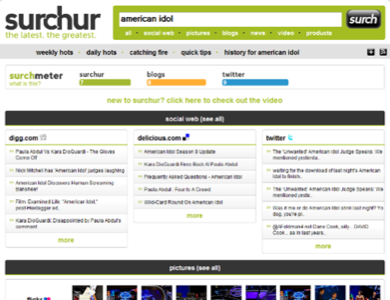Surchur, a web, blog, image, video, and social media search engine, has just relaunched their online dashboard. The company calls this an “update,” but it’s more like an overhaul of their earlier product. Launched back in spring of 2008, Surchur’s original homepage was barely even worthy of a mention, much less of use. But today, the company’s “dashboard to the now” delivers a well-designed and comprehensive view into the “real-time web” – that is, what’s happening on the internet right now.

About Surchur
The Surchur website isn’t only a search engine with an empty box awaiting your queries. It also serves as a dashboard-style homepage where the latest web trends are tracked on an ongoing basis. When you first visit Surchur, the main page features trending topics on Yahoo Buzz, CNN, Google Trends, Twitter Search, and Technorati Popular. It’s at-a-glance information about the conversations and news which are hot right now.
Links at the top of the page let you also click through to see the “Weekly Hots” and “Daily Hots,” which track topics that have been popular in the recent past.
But the new Surchur isn’t just a dashboard-style mashup of trend lists – it’s also a search engine. If you’re looking for all the news on a particular topic, you can enter your query into the box provided and then click “surch.” The engine delves into social media sites, pictures, blogs, news, video, and product searches. The only things it doesn’t return are the static pages of the traditional web, as Google would.

Performing a search directly from the search box delivers you to a dashboard where each section (social web, pictures, blogs, etc.) displays along with modules that feature the latest information from sites relevant in that niche. For example, the social web section displays modules that show the latest from Twitter, Digg, and Delicious. The Images section features flickr, Photobucket, and Pixsy. Blog Search shows Google Blog Search, Technorati, and IceRocket. You get the idea. However, you can delve into any one of these areas to see even more from those searches than what’s displayed on the initial results page.
Also handy is the new “surchmeter” which gives the topic a ranking on both blogs and Twitter based on its current “hotness.” For example, a search for the TV show “American Idol” (which aired last night in the U.S.) returned a blog ranking of “8” and a Twitter score of “9.” Unfortunately, a search for the “Oscars” returned a “9” and “8” respectively, even though that event is long-gone in real-time web terms – it aired Sunday night. That system seems to need a bit of tweaking if it wants to really rank what’s hot right now as opposed to what was hot a few days ago.

In addition, Surchur provides a plethora of RSS feeds. Any searches on the site as well as the trending topics and previously hot items can be tracked via RSS. Every section and subsection you visit has a feed, so it’s easy to subscribe to just the news you want to follow.
Why We Need This
There has been a lot of talk lately about how Twitter Search could become the next “Google killer,” but we think that may be taking it a bit too far. Clearly, the real-time web is an important vertical to follow, but it’s only a slice of the pie. The real impetus behind this ongoing debate is likely due to our deep-seated frustration with the fact that Google has not integrated a real-time web search vertical into their offerings. Instead, we’re having to turn to other search engines – like search.twitter.com or FriendFeed search – to know what’s happening now. Still, we have no doubt that a company as smart as Google is working on this problem, even if they’re not telling us about it just yet.
However, Google’s delay to launch a real-time search vertical leaves the door wide open for other startups to deliver what’s being missed. The speed with which news spreads today is moving us further away from a searchable web of ranked static pages and closer towards a web where news is posted and spread as fast as it can be typed.
Does Surchur Deliver?
The most important question when analyzing these potential new real-time engines is simply this: Are they fast enough? Sadly, the answer in Surchur’s case is “No.” A true real-time web engine wouldn’t still be displaying results for things that happened last night on their dashboard this morning. Also, Surchur’s dashboard for Twitter doesn’t even match up with the trending topics found on the search.twitter.com homepage. That points to a delay between what is happening right now and when Surchur’s web service is made aware of it. And that, essentially, kills our hopes that Surchur could be the new real-time engine of our dreams.

But if Surchur can close that gap – or if any other startup could do the same – the end result could be the next big thing in search engines. Until then, Surchur remains an innovative concept but one whose delivery isn’t quite fast enough to meet our needs.










